CHAPTER XXVI.
PARIS AND ITS BEAUTIES.
Wall, Martin felt and sed that France must be took in by him. He sed that a full knowledge of the French character, the country and the customs and habits of the people, wuz positively imperative to any one who laid any claims to fashion, and so he laid out to go to France and give it a exhaustive study. He laid out, he sed, to stay in the country not less than three days, and he might possibly stay four.
Thinkses I, with a deep inward sithe, I guess it will be a exhaustive study; it exhausted me even to think of bein’ raced so through a country, whirled on by the influence of Fashion and Martin.
But he wuz the conductor of the enterprise, so to speak, and we had to foller his rules blindly, as it wuz.
Wall, travellin’ at the rate of speed we did, my memories are apt to run together, some like the colors of a calico dress after it is washed—the blacks and reds are apt to mingle, dark eppisodes and lighter complected ones—but some memories stand out vividly, too deeply printed to fade out.
One is my Josiah’s feelin’s at not havin’ his breakfast till ’leven o’clock.
In vain the waiter told him that at any time he could have his “calf-o-lay” (French).
“Lay!” sez he; “that’s jest what I want to get rid on—lay! Do you spoze that after gittin’ up at five o’clock all my life, I’m a-goin’ to lay abed till noon?” And then the waiter murmured sunthin’ agin about “calf-o-lay.”
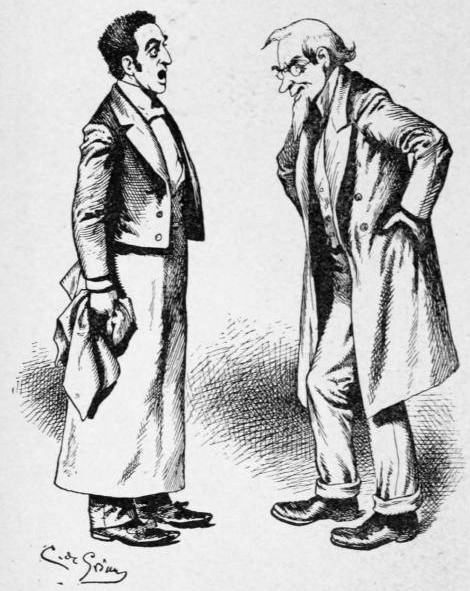
“CALF-O-LAY! I HAIN’T A CALF OR A OX!” HE SHOUTED.
And that madded Josiah agin, and sez he, “What of it—what if calves do lay! I hain’t a calf or a ox!” he shouted. “You think,” sez he, “that because I come from the country that you can go on with your insultin’ talk about calves, and intimate that I’m a calf. But I’ll let you know that you’ve got holt of the wrong individual to impose upon. Keep your dum breakfast till noon if you want to and starve a man to death, but you shall not call me a calf.”
I interrupted him and told him that he meant coffee with milk.
“Coffee and milk!” he hollered; “what is that to feed a starvin’ man?” Sez he, “I want pork and beans and potaters and slap-jacks.”
Wall, the waiter wuz skairt most to death, but I quieted my pardner down, and the next time I had a chance I bought two paper bags of cookies and sech, to appease the worst cravin’s of hunger, and administered ’em to him as I had need.
Another memory is seein’ the bathers goin’ in at Havre, and the trials I had with my pardner a-keepin’ him out of the briny surf.
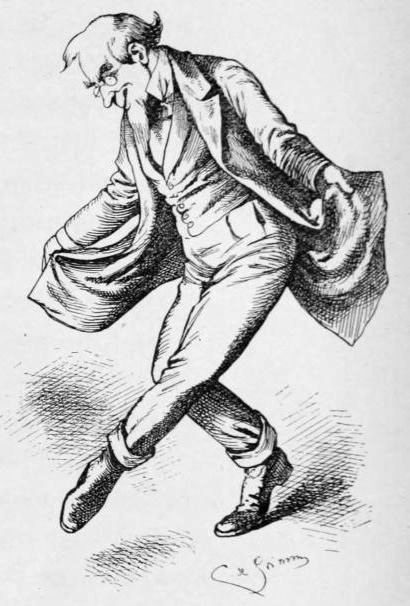
“HOW STYLISH I WOULD LOOK.”
Sez he, “Samantha, I will go in a-bathin’; jest see,” sez he, “how gayly they swim and float through the water, all dressed up in bright colors; how stylish it would look, what a air it would gin us to see you and me a-floatin’ and a-bobbin’ up and down in that element! It would be sunthin’ so uneek to tell to Deacon Gowdey and Ury.
“And then,” sez he, “we could lead the fashion to home, we could turn the buzz saw-mill dam into a perfect carnival of delight.”
I looked coldly at him, and sez I, “You’re not goin’ to make a fool of yourself at your age by bathin’ and foolin’ round in the water.”
“Why,” sez he, “you’re always preachin’ up bathin’ to me; you’ve lectered me more times than I’ve got fingers and toes about bathin’; and now that I’m willin’ to foller it up, you draw me back.”
And agin he looked longin’ly at the dancin’ surf and the gay-robed bathers and the funny bathin’ housen.
But I sez, “A big pail of water and some soap and towels and the seclusion of your bedroom are very different from makin’ a spectacle of yourself here in this hant of display.”
I broke it up.
And then at Trouville, though I spoze nobody would believe it, and he denies it now, yet sech is the force of custom and fashion on the mind of my beloved pardner that I d’no but that man would have played cards and won money mebby up as high as 25 cents, if I’d allowed it.
He denies the awful charge, and mebby he’s right. But he talked strange, strange for a deacon and a grandfather.
But while engaged in these purile thoughts while journeyin’ through France his pardner wuz thinkin’ of what we owed the country, and how it sent the flower of its youth and bravery to help us in our troublous time.
I thought of the young Marquis De Lafayette leavin’ his fair France, his ease, his luxury, and his sweetheart, to sail out fur away into the midst of privations and dangers to help a strugglin’ colony to independence.
And then I thought of how another Frenchman, Jacques Cartier, wuz the first white man to navigate our king of rivers, the St. Lawrence. Why, my thoughts soared and sailed along as I thought of them idees, most as surgin’ and deep as that noble river at its widest pint, and my pride and glory in my native land stood up above that sweepin’ current some like its Thousand Islands, only mebby not ornamented off so much as they be with palaces, bridges, cupalos, torchlights, etc., etc.
But I felt dretful riz up. And a-musin’ on Lafayette and the debt we owed France, I wondered if they got in a tussel with England or Russia or etc.—if Uncle Sam would lay to and help her in return.
But I d’no as there is any danger of our havin’ the job, seein’ she has got about six millions of defenders in her army and navy; and we about 20 or 30 thousand.
Queer, hain’t it, when the United States is so much bigger than she is?
But the fact speaks well for our republic and all the law-makers, from its President and Governors down to its Pathmasters and School Trustees.
In Havre, Alice wuz some interested in seein’ the birthplace of Sara Bernhardt. She had seen her act, and they do say, though she is considerable bony in figger and gittin’ along in years, she is a marvel of grace, and acts out all sorts of lives, and dies so nateral that you’d almost appint the day for her funeral and pick out her barriers.
I don’t spoze I could ever git to be nigh so graceful as she is, and Josiah don’t think I can; he wuz real sot on it when we talked it over.
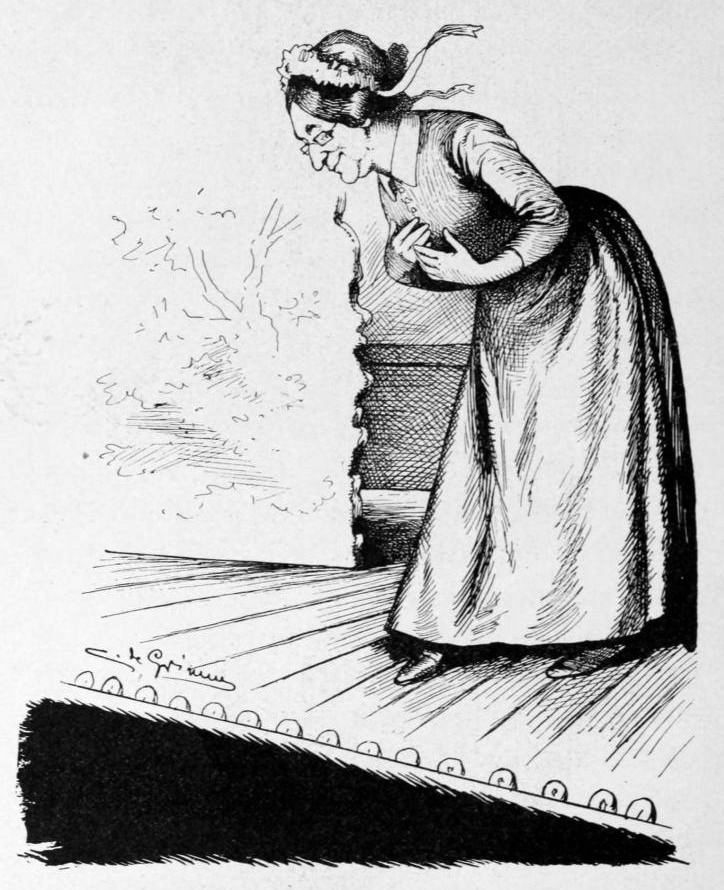
I DON’T SPOZE I COULD EVER GIT TO BE NIGH SO GRACEFUL AS SHE IS.
Al Faizi wuz interested in seein’ the birthplace of Alphonse Karr—he had read his works.
Wall, there wuz one place I wanted to see dretfully on our journey to Paris, and Al Faizi and Alice wanted to see it too. And that wuz the place where the Maid of Orleans wuz executed in 1431. I mentioned to Martin our desires.
And he sez, “Joan of Ark? What Ark,” sez he, “is that? I am not familiar with any such personage,” sez he.
Sez I, “You can call her that, or you can call her Jennie Dark; you can call it either way.”
“I don’t know any Ark or Dark,” sez he. “Was she a woman of any note? Was her calling a high one?” sez he.
“About as high as you git here below,” sez I. “She heard voices from above; angels talked with her and guided her on her way.” And I went on and related her history, brief though impressive, comin’ to me through Thomas J.
Sez Martin, “I don’t approve of following up any such impostors; I don’t believe in any such doings. Common sense don’t bear them out.”
Sez I mildly, “Mebby Oncommon Sense is needed to comprehend it, Martin.”
But he wuz obdurate, till Alice told him in her sweet way that she would really love to go there.
And then he gin in to once.
And we did go to the Place De Pucelle, where she wuz burned to death for bein’ more speritual and riz up than her burners.
I had a sight of emotions as I stood on that spot—sights on ’em.
You see, I had her story at my tongue’s end, Thomas J. had read it to me so much. She wuz a common country girl, whose parents wuz day laborers. She herself couldn’t read or write. Into this sile, prepared, as you may say—speakin’ from the laws of heredity—for only coarse labor, coarse thoughts, common desires and hopes—
In this sile sprung up the consummit flower of speritual communion. Angels talked with her. She held communion with the Exalted One. From her thirteenth year she heard voices speakin’ to her. They did not tell her to go forth to labor like her brothers and sisters; no, they told her to free France from the English, put her young king on the throne. The onseen one that talked with her enabled her to know her troubled young king, amidst a crowd of his own age and dressed jest as he wuz.
She had hard work to even see him to tell her mission, so sure wuz the Common Sense about her that the Oncommon Sense she had wuz only imposter.
But she headed the army, made that wicked, dissolute body of soldiers some like Christian Endeavorers, so ardent and sincere wuz her piety.
She won the battle. Agin and agin she defeated the enemy. She saw her young king crowned. Then she wanted to go back into her quiet home—into the garden where in the cool of the evenin’ she heard the heavenly message. She said her work wuz done. But they wouldn’t let her go. And wuz it because she didn’t foller the Voice that told her to go back to her old home—did a little personal pride, gratified ambition, ozze in and flavor the human mandate to make her stay?
I d’no, nor Josiah don’t. But she begun to make mistakes after this—lost battles, and at last her own countrymen, though allies of the English, called her a sorceress. The Common Sense found her guilty; the same C. S. burnt her up root and branch.
But the Oncommon Sense didn’t desert her. The heavenly influence that the multitude wuz blind as a bat to, and as deef as a adder, made her say in them last supreme moments—
“I did hear the voices.”
Wall, the feelin’s I had as I stood in that spot couldn’t be counted—no, not on a typewriter.
The Common Sense felt that a statute to her ort to be useful, as well as ornamental, so they made it into a sort of a waterin’ trough. And the statute hain’t what it ort to be, but my imagination filled out the details, and I see as I look at it the rapt face of the little maiden of thirteen a-lookin’ up with illumined eyes as she received the message; I see her a noble conqueror, clad in armor, stand by her young king as she see him crowned; I see her noble face uplifted to Heaven as the flames mounted about her; I hearn her say—
“I did hear the voices.”
But my reflections wuz cut short by the words:
“Well, I believe tourists usually make a short stay here; it is comparatively uninteresting. This combination of trough and monument is remarkably uninteresting, and not to be copied by Americans.
“Though considering the small water power France possesses, compared with our own great water-courses, I can’t perhaps criticise their methods so much.” This I heard on the right of me, then on the left of me Josiah’s voice—
“This has put a crackin’ good idee into my head, Samantha. You know the trough out east of the horse barn, Ury might kinder chop out a statute of me and nail it on top of it; it would be highly esteemed by my fellow-townsmen. He could put on it, you know, ”Deacon and salesman in the cheese factory.“ They’d praise the trough highly, and I’ll have Ury begin it jest as quick as I git home; I’ve got a good block of hickory over to the saw-mill.”
I sithed deep and turned away, and I see Al Faizi’s rapt face a-lookin’ beyend the statute—fur beyend, on sunthin’ that Martin and Josiah couldn’t see if they lived to be as old as Metheuseleah.
Alice looked real sweet and dreamy, too. Adrian wuz playin’ in the water.
And so each one on us wuz pursuin’ our own peticular fantoms, some on ’em as thin shadders as the materials dreams are made of, and some on ’em as real and practical as horse-blocks and anvils.
Martin sed he should make only a brief visit to France, as he had studied the country so exhaustively when he brung Alice over here to school and went after her (in all, he wuz in France about 48 hours); he sed he could spend but very little time there.
But he sed that he felt that the proper thing to do would be to visit Paris, so he could say on our return that we had come straight from Paris. I d’no why he felt so, but I spoze he did.
But we did, indeed, find Paris a beautiful city.
Martin put up at a first-class tarvern, as he always did. But I hearn him tell Josiah that they cheated him on every side. It madded Martin, for though he always duz things on a large, noble scale, and is willin’ to pay large, yet he don’t want to be cheated—nobody duz.
I found that they spoke English at the tarvern, so my worst fears wuz squenched; for how I wuz goin’ to git along and feed Josiah in a land where bread wuz “pain” and water wuz “oh” wuz more than I could tell. Besides, other things accordin’, what wuz I to do? I wildly questioned my soul.
How could I git my pardner dressed, and warmed, and git him from place to place wuz more than I could tell; but my fears wuz vain, for though jabberin’s wuz on every side on us, and rapid vocifiration in senseless brogue wuz in voge, yet plenty wuz found who spoke our good, honest, Jonesville tongue.
How clean Paris is! how gay and bright the streets look! what pretty wimmen, and what neat, smart-lookin’ men, and pretty children, too, with their smart nurse-maids! elegant carriages, splendid housen, magnificent buildin’s, and arches, and towers, and monuments, and meetin’-housen, and around everything and over everything the gay, bright atmosphere of good feelin’ and politeness.
No wonder folks love to come here, and don’t want to go away. Why, I enjoyed myself first-rate in Paris, and Paris enjoyed my bein’ there, so fur as I know; they acted as if they did, anyway; most always a-smilin’ at me and my pardner in a most agreeable manner.
Yes, they wuz glad we had lanched out and come, I hain’t a doubt on’t.
Alice had lots of school friends here, and wuz out a good deal a-seein’ ’em, and Martin and Al Faizi wuz each on ’em a-pursuin’ their own favorite fantoms—as different as any two fantoms ever wuz, from first to last.
But Josiah and me shacked round quite a good deal, Adrian a-goin’ with us quite considerable. About the first thing that strikes you as you venter out-doors is the wideness and beauty of the streets, with their double row of trees and their elegant housen, lookin’ so sort o’ finished—not put in anyhow, like a palace and a hovel, but all kinder of the same style and make, handsome as picters, and the sidewalk is as wide as from our house to the barn, and I d’no but wider. They are twice as wide as the main street in Zoar, some on ’em, where they have the most gay and beautiful stores of different kinds; and, if you’ll believe it, they have tables set out-doors in the most handsome style, and folks a-eatin’ at ’em, all dressed up and a-jabberin’ away, and a-laughin’, and havin’ a first-rate time.
Josiah wuz dretful impressed by it all.
Sez he, as if he wuz a-usin’ real big words, sez he—
“France is impressive and edifyin’ in many ways. What improvements we can witness and inaugerate to home! One thing I shall immegiately proceed to arrange; henceforth, Samantha, we shall always partake of our food out by the side of the road.”
I looked real cold at the idee, and he went on—
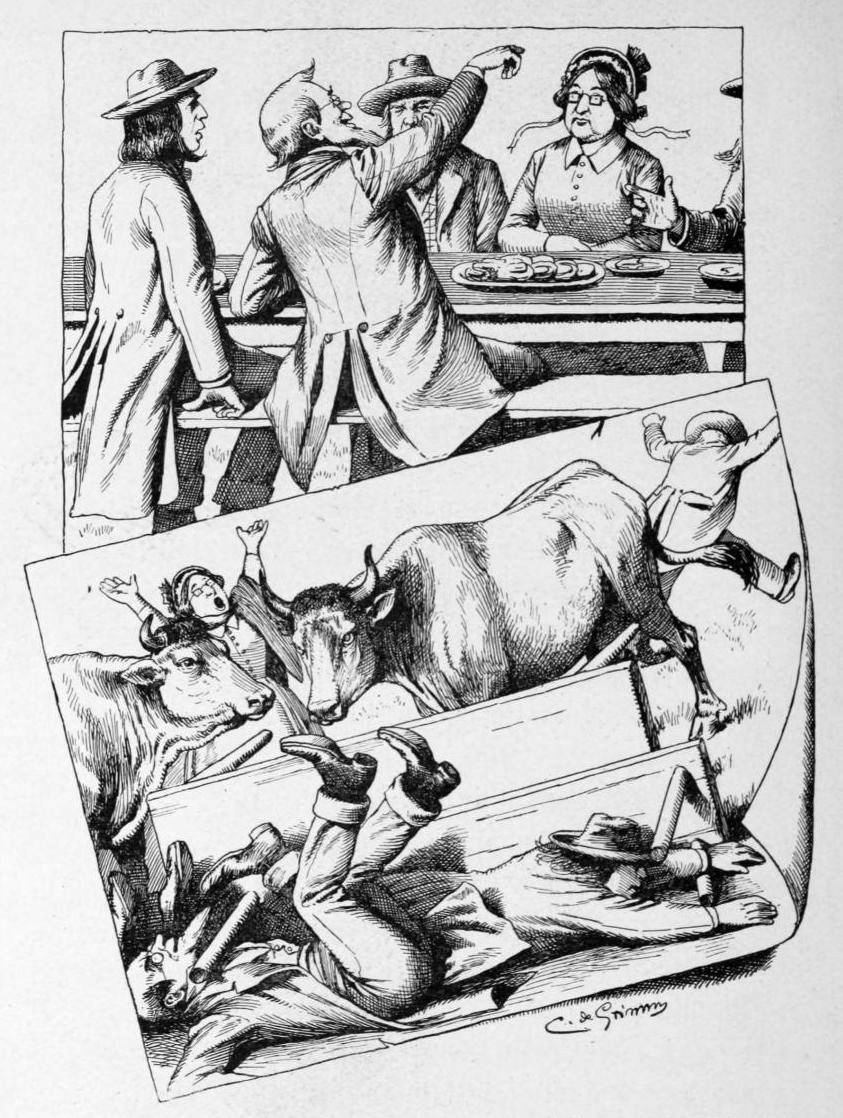
JOSIAH, “CULTERED AND TRAVELLED,” SCHEMES FOR JONESVILLIAN OUT-DOOR DINNER PARTIES, À LA PARIS, AND HOW SAMANTHA FORESEES THE RESULT.
“Jest think of the gayety, the life it will bring to Jonesville to have all the neighbors a-eatin’ out by the highway, for of course they will foller the example of those who are cultered and travelled; imagine,” sez he, a-wavin’ his hand and enjoyin’ himself first-rate in futer retrospects ahead on him—
“Imagine Deacon Henzy and Drusilly, and she that wuz Submit Tewksbury and her husband, Simon Slimpsey and Betsy, all on ’em a-eatin’ out-doors, a-minglin’ their voices with ourn as we set to our table; I with my dressin’-gown on, and you, if you wanted to, a-playin’ on a accordeon in a gay, light manner befittin’ the happy occasion.”
Sez I, “It would be a lot of fun to set down in a lot of burdocks and mullin full of dirt; and what would happen when Deacon Small driv his big herd of cows by? You know they always will go a-prancin’ and a-kickin’ up the dust and a-actin’ because he wants ’em to eat the grass along the side of the road.
“How would you like to have the table overturned by his critters, and you prostrated by a kick in the stumick as you tried vainly to protect the teapot? How would you like to have that Jersey entangle his huffs in the tossels of your dressin’-gown, and drag you at his heels?” sez I.
“And who’d bring the food out there and bear it in agin? And if you think I’m a-goin’ to learn the accordeon at my age and with my rumatiz, you’re mistakened.”
He see it wuzn’t feasible, but he wouldn’t gin in.
He drawed my attention off by pintin’ down the magnificent vista of broad avenues, three hundred feet wide, smooth as glass, and full of gay vehicles, and beyend, risin’ up like a dream of beauty and grandeur and strength, the great Arch d’Etoile.
This can never be described by Josiah or me; it must be seen to be appreciated. It is the grandest monument Napoleon has left, and cost over two millions of dollars.
But as you go on you see fountains and columns and gardens and arches and booths and groves and singers and amusements of all kinds for the people, and everything else that is beautiful and impressive and etc., etc., etc., etc.
The Place Vendôme, where memories of the great king-maker hover round the tall columns that picters out his grand, melancholy career; the Tuileries and the Louvre.
How be I a-goin’ to make the public and Betsy Slimpsey git any idee of them palaces, adorned with all that is most beautiful in art and sculpter, and that cover sixty acres of ground!
Mebby I could gin Drusilly Henzy a little idee on’t, for that is jest the number of acres of solid ground that fell onto ’em from her father.
It jest about crushed ’em—the wealth seemed to ’em overwhelmin’.
Imagine a big farm all risin’ up into palaces, beautiful as you ever see rise up into the cloudy Heavens.
The Gallery of the Louvre—wall, if Drusilly and I should undertake to pick up every little grain of dirt that goes to make up them sixty acres of hern, and have each separate one branch out into some beautiful, be-a-u-tiful form, some delicate, exquisite fancy, or some exalted figger of impressive beauty—why, wouldn’t we be tuckered out before we got through? though at the same time so riz up and inspired, that we wouldn’t know, some of the time, whether we wuz in the body or out on’t.
Wall, that may gin the public and Betsy some idee of what everybody must make up their mind to go through when they tackle the Louvre.
From the beginnin’ of time till now every land has contributed its choicest treasures to this hallowed place, from Nineveh and Egypt to Jonesville (for was not Jonesville’s choicest treasures of humanity represented there when Josiah Allen and I stood there, some like statutes, only more comfortably dressed, and lookin’ round us more?).
What poems in marble bust onto our visions, and what sights on ’em!
What marvels of ancient art!
What picters! what picters!
Oh, dear me! it lifts me up, and tuckers me out to think on ’em now. Some of the galleries wuz a quarter of a mild long.
Jest think of it here, as fur as from our house over to Old Grout Nickleson’s; and I never ust to think, when his mother-in-law was bed-rid, that I could walk it; no, I always had Josiah hitch up. And then think of that immense distance full on each side of the best of the world.
Picters by Guido, Murillo, Titian, Rembrandt, Vandyke, Leonardo da Vinci, Wouverman, etc., etc., etc.—picters that them immortal old masters had their own hands on, and bent their own glowin’ inspired eyes on.
My soul, jest think on’t!
Relicks of all the sovereigns—spurs of the old conquerors (and how they did spur things up and make ’em fly!).
Relicks of kings without number—and queens, too, and princes.
Marie Antoinette’s shues—I’m glad I didn’t have to walk in ’em, for though they trod through pleasant, luxurious places at first, they had to climb up the scaffold.
Poor creeter!
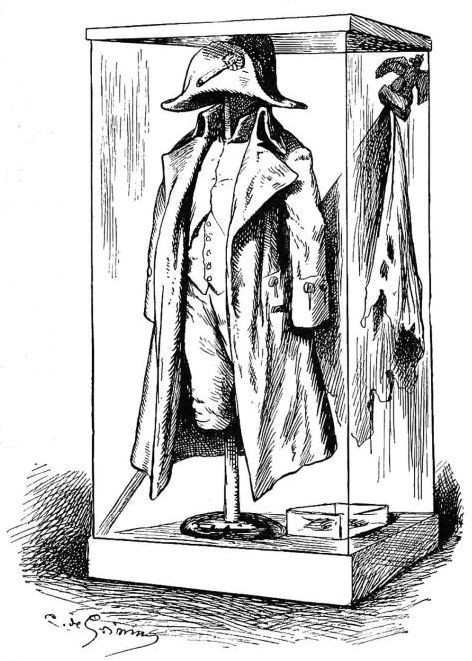
THERE WUZ THE CLOTHES HE WORE THAT HE UST TO BUTTON OVER THAT RESTLESS, AMBITIOUS HEART.
The Napoleon Room gin me a sight of emotions, and I didn’t care who see ’em. I jest about cried when I looked on that old flag he kissed in a sad hour. There wuz the clothes he wore that he ust to button over that restless, ambitious heart. Yes, and there wuz some of the hair that riz up over that ambitious brain, that wuz the terror and admiration of all Europe.
He used Josephine mean—mean as a dog, and he wuz too high-sperited and ambitious; but yet what a man, what a man he wuz! Sunthin’ good and noble must have been in him to make his soldiers love him so. How they totter up to-day to lay wreaths on the railin’ round his statute—layin’ at his marble feet the poseys of their hearts’ devotion, their highest love, and their deepest sorrer. No man not naterally noble could call forth sech affection in his dependents.
I have wished a hundred times I could have been there, and neighbored with him and Josephine, and kinder kep’ ’em together, and quelled him down some in his ambitious views—things would have been different, no doubt; I presoom she wouldn’t have died of a broken heart—years in dyin’, but so much the harder.
He wouldn’t have had to be shet up in a lonesome island a prisoner, and all Europe would have fared better.
But it wuzn’t to be—it wuzn’t to be.
Pa Smith at that time wuzn’t married, and I wuz—wall, I don’t really know where I wuz at that time, nor Josiah don’t know; it looked kinder dubersome and vague about my ever bein’ born at all, and things had to go on jest as they did.
Wall, as I have said heretofore, that gallery of the Louvre is full, full to overflowin’ of the richest treasures of art, as my riz-up brain and my four weary legs testify—my own two extremities and my Josiah’s pair on ’em.
Hisen ached like the toothache, so he sed.
He didn’t bear his weariness silently and oncomplainin’ly, as I tried to—no, with groanin’s that couldn’t be uttered hardly he kep’ by my side through them interminable galleries.
Adrian asked a sight of questions—a sight of ’em. And when I proposed to go to the Bois de Boulogne, my poor pardner asked me feelin’ly if in the name of the gracious Peter I wanted another boy a-traipsin’ at our heels a-askin’ enough questions to tire out a regiment of soldiers.
But I explained it all out to him, and we took considerable comfort there.
The place wuz more beautiful than tongue could tell. Jest as a French woman always looks better dressed up than an American or an English woman, and their cities more brilliant and beautiful, jest so are these woods fur more beautiful than Jonesville or New York woods.
Why, jest compare our sugar bush and the woods between Zoar and Jonesville with these woods of Boulogne—where be they? Further off than the golden sunset is to the vision of Josiah.
And the Elysian Fields—tongue would fail to give any idee of what we see there.
Notre Dame, perfect indeed duz it look, a-risin’ up with its two towers a-dwarfin’ the housen about it, though they are sizable ones.
The Egyptian Obelisk of Luxor, that rises up in the air one hundred feet, all full of strange writin’, I wish it could speak and tell what it had seen all through the past centuries—what its old red face must have looked down on from first to last.
Curous to even think on. I presoom it must have looked down on Cleopatra and seen her a-cuttin’ up and a-actin’, a-flirtin’ and a-carryin’ matters altogether too fur with Antony, Cæsar, etc., etc.
I wonder if the old obelisk sees any sech doin’s now in Paris in 1894?
I dare presoom to say she duz. Human nater has always capered sence the days of Adam and Eve.
It hain’t never talked on much, but I always blamed Antony jest as much as I did Cleopatra and Cæsar too; they all ort to been ashamed of themselves—and sech good wives as they had, too. Aurelia and Calpurnia wuz real good wimmen, so fur as I ever hearn on.
Wall, the big fountain, which stood not fur off, are a sight to see and are ornamented beautifully, besides havin’ immense water priveliges, and they ort to have, for right here on this spot stood that dretful thing, the guillotine.
Oh, what doin’s, what doin’s took place right here! Angels must have veiled their faces with their feather wings as they flew over the spot in them dretful days of the French Revolution. Twenty-eight hundred wuz killed here—had their heads cut right off—trompled on by men risin’ aginst tyrants, killin’ ’em off; and then they, too, turned into tyrants, wuz overthrown and killed off like sheep.
Louis XVI., Charlotte Corday, Marie Antoinette, Danton, Robespierre—oh, what dretful things to think on! But the murmur of the water as it spouted up and fell back in murmurs whispered of happier, more peaceful times.
In a place where stood the old prison of Bastille, a sile steeped with the tears and blood of the thousand and thousands of prisoners and victims, stands Liberty, a-standin’ upon a monument one hundred and fifty feet high. She always had to wade through blood, and always will, for all I know. She had a broken chain in one hand—the past is behind her, the chains are broke. She lifts up a torch in the other hand, its light streams into the futer. She don’t lay out to have any more sech deeds of darkness done if she can possibly help it—you can see that by the looks of her.








